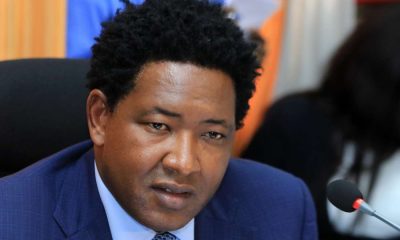Rwanda has proposed a new draft law that is aimed at regulating non-governmental organizations (NGOs) in the country.
The bill passed the crucial stage of first reading in parliament on Thursday.
The draft law is already causing jitters among the opposition and civil societies who think it is aimed at stifling their operations.
Details of the draft law
The bill by the Minister in the Office of the President, Judith Uwizeye, has requested NGOs in Rwanda not to spend more than 20 per cent of their budget on operational costs.
An operating cost is an expense from the daily operations, materials, and other necessary components an organisation uses regularly. Operating costs may include necessary expenses like rent, utilities, payroll, and supplies among others.
Activists, however, argue that the drafters of the law may not fully understand how NGOs operate, as NGOs typically allocate their budgets based on the demands of their funders.
The draft law states: “Organisation has an obligation not to exceed 20 per cent of its operating budget in activity programmes that are not in the interest of their beneficiaries.”
The proposal also aims to avoid scams by some NGOs in the country according to drafters.
One of the most common forms of NGO scams is misappropriation of funds.
Fraudulent NGOs often collect donations under the guise of supporting a noble cause but misuse the funds for personal expenses.
According to the draft law, non-governmental organisations have also been obliged to keep, for at least 10 years, the documents regarding the use of property in the country.
Once the draft law is approved, the organisations’ action plans and financial reports will be approved by districts and line ministries.
“An organisation has obligations to submit to the board its activity and financial report for the previous year and the plan of action for the coming year, approved where applicable by the district administration, the line ministry, or any other state organ having responsibilities related to the field of activity of the organisation, within the first three months of the following fiscal year,” reads part of the draft law.
Germaine Mukabalisa, one of the Rwandan MPs said the new draft law should assure the country of eliminating NGO scammers.
“We want to hear measures in the draft law against so-called charity organisations which pretend to give money and jobs to needy people but end up disappearing within a few days,” she said.
On whether the the requirement for NGOs to submit plans and reports to line ministries and districts would eliminate their independence and make them like government organs.
The minister responded that the obligation is aimed at ensuring NGOs implement their objectives and eliminate NGO scammers.
“What NGOs are doing to benefit the welfare of people should not be done in disorder. That is why what they do must be in line with what we wish on our list as government, as districts. They must be regulated. That is why the NGOs must submit action plans and sources of finance, and reports which must be monitored and approved. This will help eliminate scammers with empty promises,” she explained.
The draft law has put NGOs in categories that include NGOs aimed to benefit community development, general public interest, members’ interest based on their particularities, profession-based organisations, sports, games and sport-based entertainment organisations, umbrellas, and forum of umbrellas. Umbrella organisations carrying out related activities may form a forum of umbrella organisations.
According to the draft law, national non-governmental organisations carrying out related activities may form an umbrella organisation. However, for an umbrella to be accepted, it must be composed of at least 10 organizations.
Activists worries
Joseph Ryarasa Nkurunziza, the head of Rwanda Civil Society Platform (RCSP), emphasised the significance of soliciting more inputs from non-state actors.
“We read that districts and ministries have to approve NGOs’ action plans and budget they spent, to monitor if NGOs accomplished what they pledged. We look forward to hearing more explanation as the committee analyses the draft law to have a common understanding,” he said.
He said that the budget spending criteria also need further civil society consultations.
“Administration activities need a budget so that activities reach beneficiaries. Saying we must not exceed 20 per cent of the budget on administration activities might not be possible. For instance, research organisations and others need more than that,” he said.
According to the law, an organisation intending to spend more than 20 per cent of its operating budget on activity programmes that are not in the interest of its beneficiaries must provide prior justification in writing to the board.
LandNet Rwanda, a network of local Rwandan organisations and international NGOs which deals with land issues, also wrote to parliament on April 17, asking to reflect the views of NGOs.
“We observe that there is no policy that guides this draft law which opens room for challenges during its implementation. We recommend putting on hold parliamentary discussions on this law so that relevant authorities develop the policy first,” reads part of the letter.
The organisation also recommended the establishment of an NGO forum or council that brings together all NGOs registered in Rwanda.
The bill received 45 votes in a parliament and will now go to a parliamentary committee for further scrutiny.
Additional reporting by The New Times
Kenya Insights allows guest blogging, if you want to be published on Kenya’s most authoritative and accurate blog, have an expose, news TIPS, story angles, human interest stories, drop us an email on [email protected] or via Telegram

 Investigations1 week ago
Investigations1 week ago
 Grapevine2 weeks ago
Grapevine2 weeks ago
 News2 weeks ago
News2 weeks ago
 Opinion2 weeks ago
Opinion2 weeks ago
 Americas1 week ago
Americas1 week ago
 News1 week ago
News1 week ago
 Politics5 days ago
Politics5 days ago
 News2 weeks ago
News2 weeks ago































